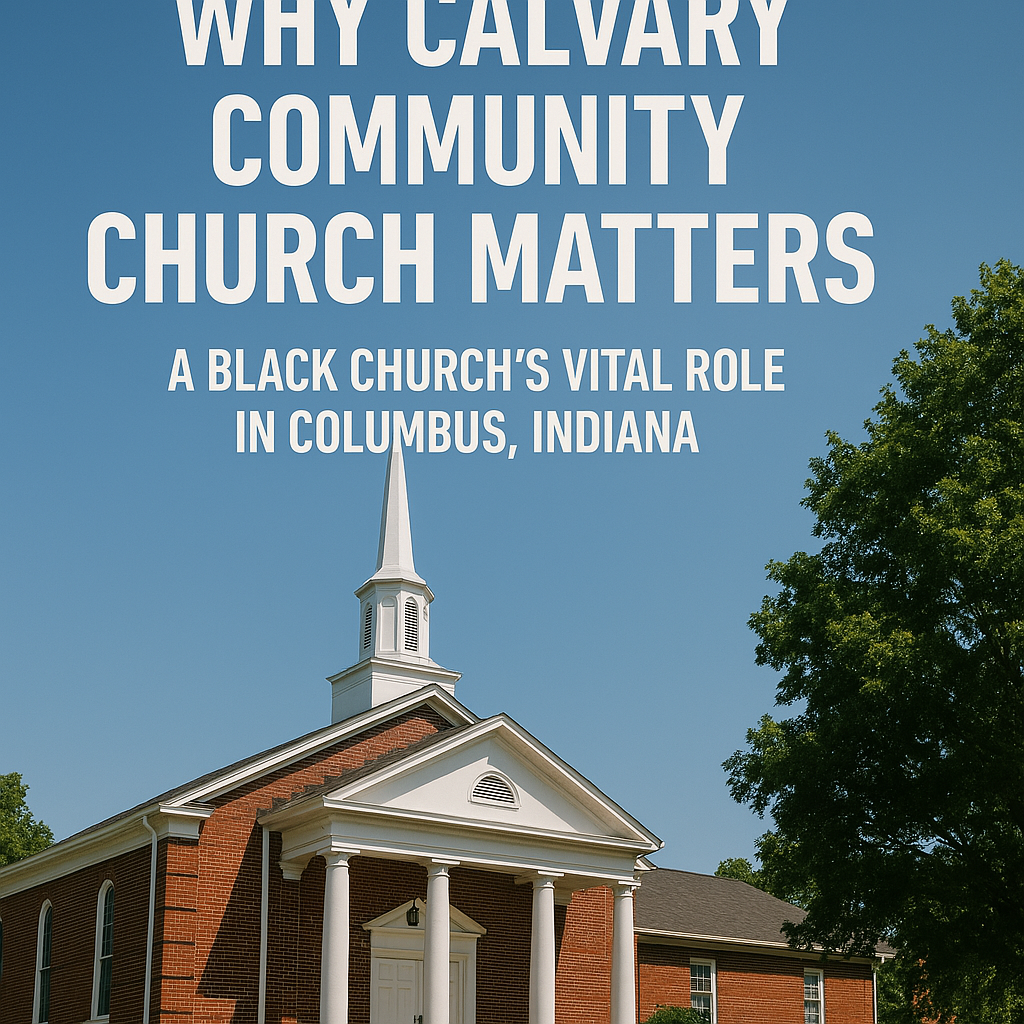

By Dr. Tim Orr
This article of mine first appeared in the Republic Newspaper.
In a city like Columbus, Indiana—known for its architectural beauty, civic pride, and spiritual vitality—there exists a church that offers something our white evangelical and white mainline churches can’t. Calvary Community Church, under the faithful leadership of Rev. Frank Griffin, is more than just a congregation. Rev. Griffin has led initiatives such as citywide prayer gatherings and mentorship programs for at-risk youth, reflecting his deep desire to see racial healing and spiritual renewal in every corner of Columbus. It is a gift to our community—spiritually, culturally, and relationally.
Rev. Frank Griffin, one of my closest friends, is a man of God who leads with humility, conviction, and a compelling vision for our city. I remember sitting with him at a citywide leaders' breakfast where he passionately outlined a plan for mentoring young Black men, not just through church programs, but through internships and civic engagement partnerships—an approach that left many in the room both inspired and challenged. His leadership has shaped Calvary into a place where the gospel is preached boldly, lived authentically, and contextualized to speak directly to the lived experiences of the Black community. In doing so, Calvary offers a vital perspective and ministry that our white churches simply aren’t positioned to provide.
A Place of Cultural Identity and Spiritual Power
The Black church has long been the bedrock of the African American community—providing hope in hardship, leadership in struggle, and a theology shaped by the crucible of injustice and perseverance. Calvary Community Church carries on that sacred tradition through ministries like its community food pantry, which feeds dozens of families each month, and its annual Juneteenth celebration, which honors Black history and fosters cross-cultural understanding in the broader Columbus community. It's a place where identity and faith are not separated, but beautifully intertwined.
For many in Columbus, Calvary is more than just a church service. It’s a spiritual refuge. A family. A place where people don’t have to explain their experiences—they’re already understood. It’s a space that affirms Black dignity and resilience while pointing to the transforming power of Christ. The style of worship, the rhythm of the preaching, the depth of community—it’s a distinct and necessary expression of the gospel in our city.
A Prophetic Voice in the City
Rev. Griffin doesn’t just pastor a church; he casts a vision for the whole city. He wants to see healing across racial lines, transformation in families, and collaboration between churches. While many talk about reconciliation, Frank lives it. He builds bridges while telling the truth. He brings people together without compromising conviction.
Under his leadership, Calvary doesn’t retreat from the hard conversations—it enters them with grace and truth. One such example was a community forum the church hosted, where Rev. Griffin invited police officers, civic leaders, and community members into a candid, prayerful dialogue about systemic racism and public accountability. The church challenges the status quo and invites all of us to see God’s kingdom more clearly: a kingdom where justice and mercy meet, where every culture is valued, and where every person has a place at the table.
What Our White Churches Can’t Offer
White evangelical and mainline churches in Columbus play vital roles and serve their communities with faithfulness. Yet there are dimensions of the Christian faith—especially those related to justice, suffering, and racial identity—that these churches often struggle to fully embody. This isn’t due to a lack of goodwill, but rather the result of differing lived experiences, cultural expressions, and historical realities.
Calvary offers something our white churches cannot: a distinct expression of Christianity rooted in the Black experience. This comes through in sermon themes shaped by the Black Pentecostal tradition, Black church history, and contemporary justice concerns. Worship is infused with gospel music, spontaneous testimony, and a theology that has been shaped as much by lament as by praise. Its outreach includes neighborhood prayer walks and youth mentoring partnerships. Its discipleship embraces the reality of systemic injustice and responds with spiritual depth forged not only in seminaries but in the crucible of everyday life.
Rather than responding with indifference or unease, white churches—both evangelical and mainline—have an opportunity to listen, learn from, and partner with Calvary. In doing so, they can celebrate Calvary’s ministry as an essential part of Christ’s witness in our city.
A Church for All of Columbus
Calvary Community Church is not a niche church. A friend of mine—a white colleague in ministry—visited Calvary and later shared how deeply moved she was by the warmth, authenticity, and spiritual depth he experienced. He said, "It was the first time I felt the gospel preached in stereo—both justice and grace ringing out together." It’s not “just” for the Black community. It is a church for Columbus. It is a living testimony to God’s faithfulness, a prophetic voice for unity and justice, and a beacon of hope for those who long to see the church reflect the kingdom of God in all its beauty and diversity.
Rev. Frank Griffin is a man of God whose life and ministry are a blessing to all of us. Through his leadership, Calvary continues to be a place where hearts are changed, lives are restored, and our city is invited to dream bigger about what the church can be.
If you’ve never visited Calvary, I encourage you to go. Not as a project. Not as a token gesture. But to receive—to receive the gift God has given our city through this church and this pastor. We need each other. And Columbus is better because Calvary Community Church is here.
